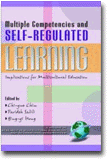
Multiple Competencies and Self-regulated Learning
Implications for Multicultural Education
Edited by:
Farideh Salili, The University of Hong Kong
Ying-yi Hong, The University of Hong Kong
Chi-yue Chiu, The University of Hong Kong
A volume in the series: Research in Multicultural Education and International Perspectives. Editor(s): Fred Dervin, University of Helsinki, Finland. Zehavit Gross, Bar Ilan University.
Published 2002
Although cultural diversity in classrooms is hardly a new phenomenon, its influences on teaching and learning are increasingly discussed. Cultural diversity could lead to better learning and democracy outcomes. However, it also poses challenges for educators and schools. For example, research has revealed marked cultural differences in motivation, learning attitudes, thinking styles and school achievement. Attempts have been made to assure teaching and learning quality by designing standardized curricula and giving standardized tests. However, it is questionable whether standardized tests could capture the diverse aptitudes and skills students with different cultural experiences bring to the classroom. It is also question-able whether a standardized curriculum would lead to positive learningoutcomes for all.
In 1998, we convened a conference in the University of Hong Kong, and invited experts from different parts of globe to discuss how to apply psychology to enhance learning and teaching quality. Probably because of the cultural diversity of the conference participants, multicultural education emerged as one of the dominant themes in the conference. For example, in the Opening Address, Robert Sternberg argued for the importance of cultural sensitivity in ability testing. In another keynote address, Martin Maehr discussed the implications of motivation research for designing an optimal achievement environment for culturally diverse students. Professor Sternberg’s paper is included in this volume, and Professor Maehr’s article was published in a previous volume we edited (Student Motivation: The Culture and Context of Learning, Plenum, 2001).
The contributors of this volume include psychologists and education researchers from Africa, Asia, Australia and North, and some of them have extensive experiences in multicultural education. Despite their diverse cultural and professional background, the contributors agree that to meet the challenges posed by cultural diversity, educators need to have the sensitivity to multiplicity of student abilities in aptitude and achievement assessment.
CONTENTS
Introduction. The Role of Multiple Competencies and Self-regulated Learning in Multicultural Education. Chi-yue Chiu and Farideh Salili, and Ying-yi Hong. PART I: Multiple Competencies. Intelligence Tests as Measures of Developing Expertise. Robert J. Sternberg. Authority and Learning in Confucian-Heritage Education: A Relational Methodological Analysis. David Yau-fai Ho, Si-qing Peng, and Fiona Shui-fun Chan. Implicit Concept Mapping: Methodology and Applications in Knowledge Assessment. Eugene V. Aidman. Analogical Problem Construction as an Indicator of Understanding In Mathematics Problem Solving. Allan B. I. Bernardo. The Changing Model of Intellectual Abilities: Effects on Schooling in Hong Kong. Jimmy Chan. PART II: Self-Regulated Learning. From Motivation to Self-regulation: Clustering Students’ Motivational and Cognitive Characteristics and Exploring the Impact of Social Interaction on Learning. Jennifer Archer. Motivation and Self-regulation: A Cross-Cultural Comparison of the Effect Of Culture and Context of Learning on Student Motivation and Self-regulation. Farideh Salili, Ho-ying Fu, Yuk-yue Tong, and Diana Tabatabai. Why Pursue a College Education? The Influence of Early Reflection and Goal Orientation on Adjustment During The First Semester. Regina Conti. Motivational Change and Transition in the Transition from Primary School to Secondary School. Judith MacCallum. Implicit Theories and Coping with Achievement Setbacks. Wai-man Ip & Chi-yue Chiu. Relationship Between Academic Performance and Use of Self-Regulated Learning Strategies Among Form Iv Students in Zimbabwe. Alex R. Matambo. An Investigative Research in Teaching and Learning in Chinese Societies. David Yau-fai Ho, Si-qing Peng, and Fiona Shui-fun Chan.
-
Paperback978-1-930608-92-4
Web price: $45.04 (Reg. 52.99)
-
Hardcover978-1-930608-93-1
Web price: $80.74 (Reg. 94.99)
- eBook9781607526865

-
 Culture, Motivation and Learning
A Multicultural Perspective
Culture, Motivation and Learning
A Multicultural Perspective
-
 Democracy and Multicultural Education
Democracy and Multicultural Education
-
 Growing Up Between Two Cultures
Issues and problems of Muslim children
Growing Up Between Two Cultures
Issues and problems of Muslim children
-
 Indigenous Postgraduate Education
Intercultural Perspectives
Indigenous Postgraduate Education
Intercultural Perspectives
-
 Religion in Multicultural Education
Religion in Multicultural Education
-
 Silent Partners in Multicultural Education
Silent Partners in Multicultural Education
-
 What the West Can Learn From the East
Asian Perspectives on the Psychology of Learning and Motivation
What the West Can Learn From the East
Asian Perspectives on the Psychology of Learning and Motivation

